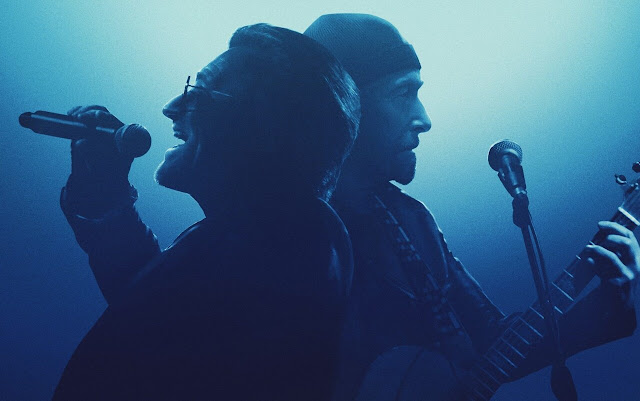Bono & The Edge: A Sort of Homecoming
It's hard, when you are born in the midst of a storm, to see the horizon and imagine it's ever going to end. I was born in the mid-1970’s to a British military family. My view as a child and probably into young adulthood would have been inevitably skewed by my upbringing. The troubles in Ireland, the storm, plagued everyone for far too long. When you are an English person, raised in a military that had their dirty fingers in the blood-pudding pie it's hard to see the era from the outside and look at it calmly. All the news we received came from British national press or military media; my earliest political and religious opinions were informed by my parents lifestyle. I was brought up on a military base in Germany that was bombed by the IRA, so for the longest time I was filled with... certain bias. It took many years before I started to see the world differently. I developed an interest in political history which I didn’t have as a child and the changing world added to my personal growth as a human being. Experiencing life outside of the family dynamic, I was desperate for the slightest understanding of what has occurred in Ireland and the atrocities committed by both sides during the affair.
I tell you all this because it clouded my musical relationship with U2. I am more than aware that the legacy of the troubles, the events and loss of life contained within that brutal era of history are much more important than what one middle aged guys opinions on a band are but through my own learnings and self-discovery over the years, and now thanks to new documentary hosted by David Letterman, I have come to a new appreciation of a band I derided, from a country with which I had… history.
***
U2 are one of the biggest musical acts of the last century, and probably the most recognisable bands of my lifetime. At the time of writing this I have just turned forty-eight years old, and the band have been together, unchanged in line up, since before I was born. U2 and I should both feel pride in this fact, itself a remarkable achievement. Even The Rolling Stones have had changes to their line up over the same span.
What I enjoyed the most from the documentary film were the scenes of Letterman, out and about in Dublin and the surrounding area, learning about Ireland, about the religious struggles the countries have in their history and the changes that the last few decades have brought. It was fascinating to gain insight into the liberalisation of an entire nation, how quickly and brutally it happened, from the people who lived it. There was history explained in a calm manner with no slant to any bias from Anton Corbijn, the Dutch filmmaker who is largely responsible for the visual look of U2 for so many years, and input from performers and
people who are now standard-bearers of a changed Ireland.
David Letterman’s affable, loose style of interviewing makes for an honest conversation with Bono and The Edge, all whilst the duo prepares for a stripped-down performance at a famous Dublin theatre (whilst Larry Mullen Jr is in recovery and Adam Clayton is making a film). All of this melds perfectly with classic clips of a sold-out U2 stadium performance mixed with footage from the intimate theatre gig.
***
A Sort of Homecoming made it obvious that a lot of my past views on U2 as a band, as performers, and as activists were heavily influenced by my military upbringing. I used to see U2 as protest Pop with a diluted Punk edge, like Punk without the spunk. Now, I have a better understanding of the songs U2 have written over the decades, some titles are perhaps more important to me having heard their origin stories. During their journey from pilgrim messengers to global pop icons there have been missteps, of course, no trail through uncharted territory is ever without a pratfall or two. Bono has aligned himself with questionable politicians at times and whitewashed their pasts to the tune of financial support for his charitable work. Even in Bono’s Utopic world, apparently you still have to grease the wheels to get anything done. It is a testament to the character of the other members of the band that they have kept each other in check over the years, and a testament to friendship that they’ve remained close through turbulent times.
Perhaps I shouldn’t look too harshly at myself for my previous views. I am human, far from perfect, and no child can help what side of history they born to. I have at least tried to educate myself better on complex issues and in doing so I have gained a better understanding for a musical act that others worshipped, which I never got the hype for, who I now maybe kind of respect and enjoy? Am I now the biggest U2 fan in the world? No, of course not. When it comes to 1980s Protest Era music, I’m still rocking The Clash, The Alarm, and my other go-to bands. But if a U2 song sneaks into the queue I’m probably not going to hit skip anymore, and I no longer cringe at the thought of U2 appearing on my television, so long as they never force their music onto my phone again.
Serious matters often need an extensive conversation, deep-dives into understanding, for us to learn and change. But sometimes all you need is David Letterman to sand off the abrasive edges of a rough-hewn personality with his toothy grin and suddenly it feels just a little bit easier to accept that we each have our own role in this world.






Post a Comment